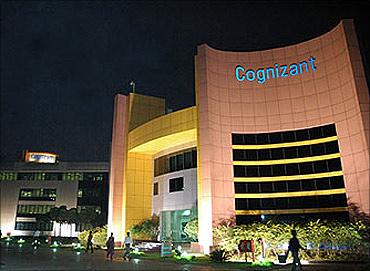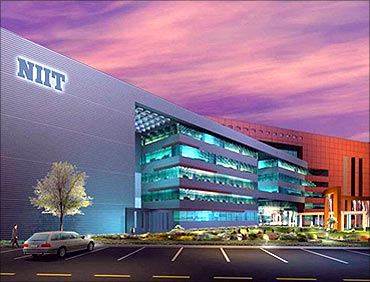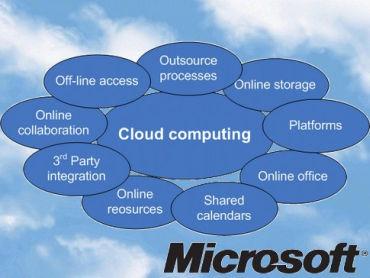 | « Back to article | Print this article |
11 job-friendly diplomas for IT graduates
Information technology, though a promising discipline on its own, plays a major role in other sectors like banking, manufacturing, telecom, hospitality, hospitals, etc, aiming at improving competence and enhancing revenues.
There is a huge demand for software programming, data mining, business intelligence software, analytics courses, cloud computing, data warehousing, android and windows mobile-based applications development both in India and abroad, says Swapnil Dharmadhikari, CEO, ePravesh, a platform for online admissions.
In order to meet this demand, it is imperative that students get trained to meet the required standards.
"Major IT companies prefer their recruits to hold a formal degree, the smaller ones are comfortable even with domain or technology-specific certifications and hire fresh graduates (non-engineers) who show real promise," says Pankaj Mittal, Director (India, Middle East & Africa), Archelons, a global recruitment and talent acquisition company.
However, IT education still has a long way to go. Though in metropolitan cities institutes are better equipped, in tier-2 cities and towns, they do not have updated syllabus. Inter-personal skills is another attribute where students are found wanting across cities.
"Updation of curricula is necessary looking at the pace of change in technology. Teaching industry-specific topics to students needs much emphasis if one has to make them employable. Though IT education in India has improved in the last decade, the concentration of excellent technical skills is limited to certain parts," says Timi Kwatra, Recruitment Head, Virtusa Corporation.
The education in this sector is mainly divided into four segments -- vendor-based certifications, vendor-neutral certification, government-based certifications and specialised programmes that are offered by private institutes.
Vendor certifications
Achieving an IT certification from a company that develops IT products could double the market value of a job-seeker as it acts as an authentic testimony of one's learning. Further, a certification allows the student to use the respective company's logo on his/her business card and website, and s/he becomes a member of exclusive social networking communities of that company.
A student can choose to prepare for these courses through classroom training at approved centres, or buy approved training material for self study, or devote time on the computer to study online.
"Simulation softwares have made online IT education easier. They can be used to assess cognitive as well as practical abilities," says Krishna Kumar, Director, Simplilearn.com.
In the following pages, we bring you a compilation of the IT certifications that are most sought after.
Please click NEXT to continue reading...
1. Microsoft Technology Associate (MTA)
Microsoft offers MTA certification suite for beginners.
It helps in understanding core IT infrastructure, software development, and database administration knowledge.
After the course, one can find a job in Big System Integrators from SWITCH companies (Wipro, Infosys, TCS, Cognizant and HCL) as well as in consumer companies and small and medium businesses (SMBs).
Hands-on hardware or technology experience is recommended, but not always required for those who opt for this certification.
Each MTA certification exam covers a broad technology area like server administration, security or network fundamentals.
Job profiles: Programmer, Software Analyst, Software Developer, System Administrator
Starting salary: Rs 2 lakh to Rs 5.5 lakh annually
Exams: Any one out of a set of 11 exams based on area of interest
Cost: $80 (for commercialised segment)
In this interview, Lokesh Mehra, Director, Education Advocacy, Microsoft asks aspirants to be cautious of gray market institutes. Excerpts:
What is the need for an IT certification?
Certifications are designed to make it easy for hiring managers to identify such candidates who have already gained a minimum set of skills in core technologies. These continue to be valuable even as you move on to specialise in a certain solution area.
So they are necessary for five main reasons -- relevance, proof of experience, recognition, better productivity, and higher salary. A certification also fulfils the training gap as it consists of various simulation and real-life projects.
Is it alright to study for these certifications online?
Online learning would be only self-based learning. Exposure to training environment is necessary. An authorised learning partner gives you the benefit of practical exposure versus a self learning mode.
You should be able to demonstrate all the skills described in the exam preparation guide before you take any exam.
What to look for while selecting an authorised learning centre?
There are four parameters. First is faculty, who should be certified to teach the given course. Next is infrastructure. The institute should have well-established labs with appropriate number of servers, routers etc. Then comes curriculum.
Students should check if it has been directly provided by the OEM. Lastly, one should ensure that they would get the same certification in the end for which they aspire.
How can one check for these parameters?
Interrogate as much as you can. Talk to the institute. There are in-house counsellors, quiz them too. Do web research. Apart from the company's website, check on search engines. Alumni are the best people to share the report card. So find them and find out about the institute.
There are many other IT courses available in the market, which are not vendor-based. Would you recommend them?
Yes, if they are AICTE or UGC approved. Other than those, there are the 'gray market institutes' in the industry and it's a bad idea to go for them.
2. Cisco Certified Network Associate (CCNA)
This qualification is for a career in networking.
The CCNA certification instils in a student the ability to install, configure, operate, and troubleshoot medium-size route and switched networks, including implementation and verification of connections to remote sites in a Wide Area Network (WAN).
The curriculum includes basic mitigation of security threats, introduction to wireless networking concepts and terminology, and performance-based skills. The certification is valid for three years.
To recertify, one has to pass another exam before the certification expires. Cisco advises that the only authorised publisher of books for Cisco certification self-study and network technology learning is Cisco Press.
Job profiles: Network Engineer, IT Manager, System Administrator or Network Administrator
Starting salary: Rs1 lakhs to 4 lakhs annually
Exams: Either two exams (ICND-1 640-822 and ICND-2 640-816) or one exam (CCNA 640-802)
Cost: $300
3. Red Hat Certified System Administrator (RHCSA)
Red Hat is the leading Linux and open source solutions provider.
The RHCSA certification aims at mastering actual competencies in system administration, including installation and configuration of Linux system and attaching it to a live network.
The exam consists of one section lasting up to 2.5 hours. For preparation of the exam, one has to study Red Hat System Administration I and II courses.
Exam results are e-mailed within five business days of taking the exam.
Job profiles: Linux-based System Administrator
Starting salary: Around Rs 2 lakh annually
Exams: EX200, a half-day hands-on lab exam
Cost: $400
4. CompTIA Certifications
While the vendor certification trains you in a particular product, vendor-neutral certifications act as a foundation to the concept.
They focus on methodology and technology. For instance, if someone has to build a career in networking then before going for CISCO products, one should understand the concept through a neutral certification.
Pradipto Chakrabarty, Regional Director, CompTIA Technology India, explains that vendor- neutral certifications are generally developed by creating a Job Task Analysis (JTA) with the help of working professionals who act as SMEs (Subject Matter Experts) coming from different companies.
These JTAs are then collated and questions are written keeping the job tasks in mind. There are mainly three such certifications popular in India:
CompTIA Certifications
These cater to basic knowledge of platforms such as networking, security, storage and servers. The A+ and Network+ are for beginners.
Pradipto shares that CompTIA-certified people are preferred in companies such as HP, Unisys, Dell, McAfee, Wipro, Cognizant, TVS Electronics, Samsung and many other IT Support/IMS companies.
Job profiles: IT Support, Network engineer/Administrator
Starting salary: Rs. 1.8 lakh to Rs. 2.4 lakh annually
Exams: Essentials & Practical Application (for A+), Network+ exam
Cost: $100 (A+), $143 (Network+)
5. Project Management Institute's Certification
PMI offers Certified Associate in Project Management (CAPM) certification for project practitioners.
It helps in attaining fundamental knowledge of project management and understanding the terminology and processes related to it.
After this certification, you become eligible for Project Management Professional (PMP) which is the most important industry-recognised certification for project managers.
According to the PMI Salary Survey Sixth Edition, a PMP can earn at least 10 percent more than others, thus ensuring an annual salary starting at Rs 5 lakhs to as high as Rs 22 lakhs in some cases based on the experience as a PMP.
Job profiles: Project Management
Starting salary: Rs 2 lakhs to 5 lakhs annually
Exams: PMI's CAPM test
Cost: $300
6. EC Council Certifications
The International Council of Electronic Commerce Consultant (EC-Council) offers Wireless5 and Network5 certifications.
The former is for individuals who want to gain expertise in basic knowledge of wireless technologies.
It has nine modules viz. Wireless Communications, IEEE and ETSI Wireless Standards, Wireless Signal Propagation, WLANs and Operations, Wireless Technologies, Wireless Protocols and Communication Languages, Fundamentals of RFID (Radio Frequency Identification) Wireless Devices and Wireless Security.
The Network5 is for those who wish to gain competency in fundamental networking concepts. It provides knowledge in overcoming troubleshooting too.
Job profiles: Wireless Administrator, Wireless Network Expert, Wireless Network Analyst, Information Security Officer, System Security Officer, Network Security Officer
Starting salary: Around Rs 2 lakhs annually
Exams: One exam each for both certifications
Cost: $100 each
7. DOEACC (now NIELIT)
DOEACC, now known as National Institute of Electronics and Information Technology (NIELIT), offers one-year 'O' level diploma at the entry level which is equivalent to a foundation level course in Computer Applications.
The course's USP is that it's recognised by the All India Council of Technical Education (AICTE), Ministry of Human Resource Development (MHRD). So the qualifiers become eligible for government jobs.
Any student who has passed 10+2 or ITI certificate after class 10 is eligible to do this course.
The syllabus consists of three compulsory and one elective module. The mandatory ones are IT Tools and Business System, Internet Technology and Web Design, and Programming & Problem solving through 'C' Language. Electives include application of NET Technology, Introduction to Multimedia and Introduction to ICT Resources.
At the 'O' Level there is one project for which no marks are assigned but it is important from the point of practical training.
It's after this course that a student becomes eligible for 'A' level diploma (an advanced programme).
Job profiles: IT-related government jobs in various segments
Starting salary: Around Rs. 50,000 annually
Exams: One exam for each module. You need to clear at least two modules to pass.
Cost: Rs 125 (for study material) + Rs 500 (exam fee per module), Rs 1000 (training fee by centres)
Meanwhile, the Centre for Development of Advanced Computing (C-DAC), an entity under the Department of Electronics and Information Technology (DeitY), Ministry of Communications & Information Technology for carrying out research in IT, Electronics and associated areas has established Programme for Advancing Computer Education (PACE) aimed at easing the use of Indian languages on computers and thus, giving people across the nation a chance to make a career in the software industry.
During the programme, emphasis is laid on industry communication and project-based training. In this scheme, diplomas are offered in various IT-related subjects like Java, E-Commerce, Computer Multilingual Programming, Computer Multilingual Applications, Graphics and Multilingual Desktop Publishing, and Multilingual Web Technologies.
8. NIIT's GNIIT programme
Along with providing training for vendor-centric and vendor-neutral certifications, some private institutes in India offer their own designed programmes.
Instead of going for separate courses/certifications, these programmes allow students to study a plethora of subjects at different levels in one package.
Earlier these institutes were only known to offer short-term courses in programming languages, but with changing industry trends, various networking, operating system, hardware and software development programmes etc, have triggered the demand. Since these institutes have centres pan-India, students find it easier to go for classroom training.
The programmes give the students the benefit of dual qualification also as they can be pursued along with graduation. The main institutes include NIIT, Aptech, the IIJT (Indian Institute of Job-Oriented Training) and Jetking. Description of their specialised programmes are as under:
This programme aims at preparing students in diverse fields of IT on the basis of its all-new cloud-centric curriculum. Students are taught through both physical and virtual classroom learning as well as online learning using Cloud services.
It is a seven-semester programme with five semesters of training and two semesters of industry internship. The first five semesters are of 254 hrs and internship is for one year. This one year of internship gives exposure to 'live' case studies.
Amitabh Lahiri, Chief Business Officer, Career Building Solutions, NIIT says that over 1.6 lakh NIIT students have been placed since 2005 in various firms including those listed in Data Quest Top 10 companies.
Students enjoy features like 24x7 lab and e-library access, instant tech updates, interaction with faculty and peers and access to online video streams during the course. GNIIT is a credit-based curriculum.
Job profiles: Cloud Applications Developer, Enterprise Application Developer, Business Intelligence Solutions Developer, Server Administrator, Network Administrator
Starting salary: Rs 1 to 1.2 lakhs annually
Exams: English test for admissions. One exam per semester to pass.
Cost: Rs 1.5 lakhs
9. Aptech's ACCP Programme
The Aptech Certified Computer Professional (ACCP) programme is a one-year career diploma.
A key feature is its Microsoft Official curriculum. During the programme stress is given on programming techniques and coding.
Students are exposed to different platforms including mobile application development and cloud computing. Latest open source technologies for web application development are also roped in.
It is a two-semester course -- Office Management suite and Programming techniques. Though the programme covers basics, a student can choose to do specialisation in .Net or Java at an additional cost.
Classes are held three or five times a week comprising two-hour theory and lab sessions held alternately.
As it is computer-based learning, practical orientation comes automatically, and no internship or field training is involved.
10. IIJT's course on Cloud Computing
According to a recent study conducted by International Data Corporation (IDC), over two million jobs would be generated by cloud computing in India by 2015.
So going for IIJT's course on cloud computing - the IT Infrastructure Management Specialist Course (ITIM), may be a good option.
Candidates having completed their 10+2, along with CompTIA's A+ and Network+ are eligible to apply to this course.
Davuluri P, Senior Vice President, Enterprise Learning Solutions (corporate training wing of IIJT) says, this 10-month course spread over 416 hours has 6 modules covering management of essential operation components, such as policies, processes, equipment, data, human resources, and external contacts, for overall effectiveness.
Around 10 students are taken per batch with multiple batches running in parallel. After completion of the course, students can apply for jobs that involve data management and storage management.
Job profiles: Support Executive, Technical Solution Consultant, Product Specialists, Manager Products, System Analysts/Architects/Designers, Manager Products, etc.
Starting salary: Rs 1.2 lakhs to Rs 3 lakhs annually
Exams: One exam each for all the modules
Cost: Rs 90,000
11. Jetking's JCHNP
If you are planning a career in hardware, then Jetking Certified Hardware and Networking Professional (JCHNP) programme is a good choice.
The 15-month course consists of five modules which act as certificates in their own right. These are: Certificate in Basic Electronics, Computer Hardware & Office Tools, Certificate in Client Operating System Support & Networking Fundamentals, Certified Microsoft Windows Server 2008 and Network Administrator, Certified Desktop Linux Administrator and Certificate in Network Administration.
The course can be done after 10+2. Placement guarantee is one of the most important features of this institute. Classes of 20 students per batch are held 6 days a week for two hours between 7 am to 9 pm.
There is a scholarship scheme for girl students wherein 25 per cent discount is given at the time of admission.











